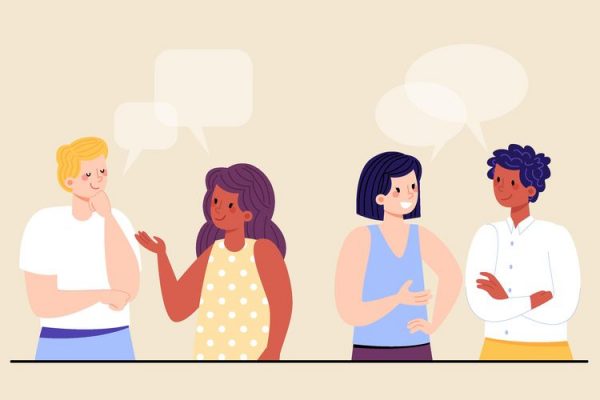Communication skills are one of the most essential and important life skills in modern society. If you have good communication skills, you will have business relationships and friendships that will be very helpful for your future life. So what are communication skills? The role of communication skills in life, some of the most effective communication skills will be detailed by MINSoftware in the article below.
Main Content
I. What are communication skills?
According to Wikipedia, communication is the act of conveying the intentions and thoughts of one subject (which can be an individual or a group) to another subject through the use of signs, symbols and communication rules that both parties understand.
Communication skills refer to the ability to give and receive information effectively through: language, emotions, and communication symbols. Becoming a good communicator involves many different skills, but the goal is to achieve results when communicating.

II. Why communication skills are important
- Communication is an essential part of our daily life such as family, friends, work. If you have smart and appropriate communication skills, you can easily achieve friendships or business relationships.
- From interacting with our friends and family to interacting with strangers in public, communication acts as a medium. It is the way we talk, the way we use words, the body language to interact with people around us.
- Communication is used to control specific areas of the relationship between you and the other person. You can exchange emotional expressions with others and share important information. The better your communication skills, the better you can get your message across. Even learning to give presentations at work or in an organization requires good communication skills. Without them, others will not be interested in listening to what you have to say.
III. The most effective communication skills
1. Active listening
Practicing active listening is the first step to becoming a great communicator. People listen with the intention of responding rather than understanding. A great communicator will listen to the concerns, questions, and instructions of their colleagues and superiors and will be able to make decisions based on an accurate understanding of the situation.
It's pretty simple: if you don't understand what someone is saying, you won't be able to give them what they want. An active listener asks questions when clarification is needed and adjusts their delivery based on who they're talking to and the situation at hand.

2. Nonverbal communication
Nonverbal communication is a form of body language. Things like posture, eye contact, gestures, handshakes, and facial expressions are all part of nonverbal communication. Listeners pay attention to all of these elements when they are analyzing the information you are providing. Confident posture, direct eye contact, and a relaxed face will demonstrate confidence and make it easier for the listener to absorb the information being said.
3. Show respect
People will be more open to communicating with you if you show respect for them and their thoughts. Essential activities such as using an individual's name, making eye contact, and actively listening when a person speaks will make them feel valued. If you are communicating on the phone, avoid interruptions and focus on the discussion.
4. Adjust volume and clarity
It is essential to be clear in your points when you are speaking. Modulating your tone of voice so that you can be heard in different contexts is a skill and essential to effective communication. Speaking too loudly can sometimes be disrespectful or awkward. If you are not convinced, look at how others are communicating.
5. Give feedback
- Being able to give and receive feedback appropriately is an essential communication skill. Supervisors and managers should consistently seek constructive feedback from employees via email or phone calls. Likewise, you should encourage input from others. Ask clarifying questions if you are unsure about an issue.
- Also, when you’re about to receive feedback, it’s important to practice the active listening we mentioned earlier. It can be difficult to hear negative feedback about yourself, but taking the time to reflect on what others are saying about you is an important part of improving, not just as an employee, but as a person.
6. Always maintain a positive attitude
- In communication, the listener's body language such as slight nods, eye contact with the speaker, attentive listening... all show that you are interested and have a positive attitude in listening and interacting with the speaker.
- Or in meetings and conversations, it is difficult to avoid conflicts and tension. And the best way to improve communication skills in these cases is to always maintain a positive attitude. You should remember that there are things that will not go according to the original plan that you set out, so just smile, be optimistic, and be happy to "keep peace" in relationships. If you find it difficult to control stress, you can apply some methods such as: exercising, breathing evenly when stressed, meditating to calm your mind...
7. Choose your words wisely in communication
The other party in the communication process, especially in business and consulting, often pays attention to the language we use. Through that, we can get information and objective assessments of the level and personality of the other person. You need to choose your words carefully during the communication process to score points with your partner.
8. Actively use reflective language
“Mirroring” language here is understood as a form of non-verbal communication that is similar to the actions of the person opposite. According to language expert Susan Constantine, non-verbal communication accounts for 90% of the effectiveness of communication. Therefore, when exchanging and talking with others, pay attention to your gestures and actions. In particular, non-verbal communication must be performed in a subtle and skillful manner to avoid causing discomfort to the person opposite.
9. Pay attention to the other person's feelings
Paying attention to other people's feelings and respecting their feelings shows that you are a very delicate person, which will create sympathy from the other person. Specifically, you should learn to praise the positive aspects of the other person, and at the same time know how to sympathize with the difficulties they are facing. And always pay attention to your words, because they can affect the standards of others.
10. Control your emotions
- If you want to be an intelligent communicator, you need to learn to control your emotional responses. This means staying calm even when you are really angry and frustrated, and not letting negative actions dictate the flow of your conversation.
- Controlling your emotions is considered an extremely important principle and skill in communication to make a difference in the relationships around your life.
In addition, for online business people, good communication skills require excellent order closing skills. You must convince customers to close orders and buy products for the goal of the communication process to be truly successful. To achieve the best sales results, business people need to implement effective marketing campaigns by using Facebook interactive software and other platforms to reach potential customers quickly.

Hopefully the above article has given you a clearer view of communication skills and the elements needed to have a good conversation with customers and colleagues. If you need an effective Marketing solution, please contact us via the page MINSoftware Let us show you unique ways to improve your Marketing process.

















